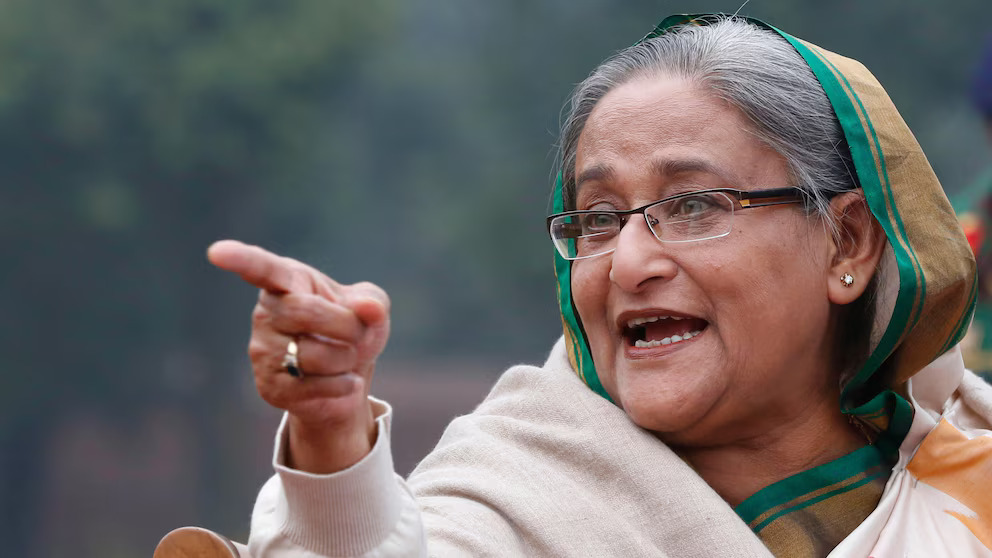The International Crimes Tribunal of Bangladesh convicted and sentenced former Prime Minister Sheikh Hasina to death on Monday, November 17. Hasina, popularly known as Bangladesh’s “Iron Lady” is being tried in absentia over alleged crimes against humanity committed during last year’s student-led agitation that led to the fall of her Awami League government.
Reacting to the same, Hasina said the verdict announced against her on Monday were “biased and politically motivated”.
The main charges against Sheikh Hasina include inciting violence and inhumane acts through law enforcement and party members, ordering the use of lethal force against student protesters, and ordering specific killings of students. A UN rights office report estimates that up to 1,400 people were killed between July 15 and August 15 during the “July Uprising” as her government ordered a sweeping security crackdown.
Along with Sheikh Hasina, the International Tribunal for Bangladesh has also sentenced former Home Minister Asaduzzaman Khan to death. Another accused former police officer, Al-Mamun, was given only five years in prison because he became the approver.
Verdict against me “biased and politically motivated”: Sheikh Hasina
Bangladesh’s former Prime Minister Sheikh Hasina said the verdict announced against her on Monday were “biased and politically motivated”. “I am not afraid to face my accusers in a proper tribunal where evidence can be weighed and tested fairly,” Hasina said in a statement. “Was given no fair chance to defend myself in court,” she added.
“Verdicts announced against me made by a rigged tribunal established and presided over by an unelected government with no democratic mandate. We lost control of the situation but cannot characterise what happened as premeditated assault on citizens,” she further said.
Meanwhile, Sheikh Hasina’s party the Awami League has already said that a farce is being carried out in the name of trial in the Jamaat-influenced ‘Kangaroo court’. They have repeatedly said that where there is no opportunity for self-defence, there can never be a fair trial.
Charges against Sheikh Hasina
Sheikh Hasina allegedly referred to the protesters at Bangladesh’s Gana Bhavan on July 14 last year as ‘children and grandchildren of Rajakars. The protesters were attacked by members of the security forces and Awami League members on the orders of the former Home Minister, IGP and other higher authorities.
Although the word ‘Rajakar’ or ‘Razakar’ was initially used to mean ‘volunteer’, during the Bangladesh Liberation War it referred to a paramilitary force allied with Pakistan and opposed to independence. This force assisted the Pakistani occupation forces during the Liberation War and suppressed and killed Bengali freedom fighters. Today the word is used as a synonym for traitor and cheat.
Hasina allegedly ordered the killing and elimination of protesters. Helicopters, drones and even lethal weapons were ordered to attack them. As a result, more than a thousand protesters lost their lives on that order.
There are allegations that Sheikh Hasina and three others incited the murder of Abu Sayeed, a student of Begum Rokeya University in Rangpur.
On August 5, 2024, law enforcement officers shot and killed 6 people in Dhaka’s Chankharpul allegedly on Hasina’s orders. Hasina also allegedly ordered to burn 5 dead bodies and one injured person in a police car in Ashulia, Dhaka.
Role of Sheikh Hasina in shaping Bangladesh
Hasina was born on September 28, 1947, in Tungipara in the then East Pakistan, into a family that would come to define Bangladesh’s identity. Her father, Sheikh Mujibur Rahman, led Bangladesh to independence with India’s help in 1971 and became its founding father.
After the assassination of her father, Bangladesh’s founding leader Sheikh Mujibur Rahman, and most of her family in a 1975 military coup, Hasina spent years in exile. She returned to Bangladesh in 1981, assumed leadership of the Awami League, and played a crucial role in the struggle to restore democracy from military rule, facing house arrest on multiple occasions.
Sheikh Hasina is referred to as the “Iron Lady” of Bangladesh due to her resilience in overcoming immense personal tragedy and political challenges, combined with her firm, often authoritarian, grip on power during her long tenure as Prime Minister.
Under her leadership, the Awami League swept the 2008 general election; the 2014 election, which was boycotted by Zia’s Bangladesh Nationalist Party (BNP); and the 2018 election, giving Hasina one of the world’s longest tenures for a female leader. During her premiership, Bangladesh saw rapid economic growth, major infrastructure achievements like the Padma Bridge, and advances in poverty reduction. The country also became a global garment powerhouse.
But the accolades came alongside accusations of clampdowns on dissent, curbs on the media, arrests of opposition leaders and the expansion of state security powers.
In 2024, student-led demonstrations, which initially erupted in protest over quotas in government jobs for children of independence war veterans, later exploded into a nationwide uprising against Hasina’s regime. The crackdown that followed unleashed spirals of violence, ultimately ousting Hasina from power and forcing her to flee to India.


